Boosting Your Child's Immunity: Natural Ways to Keep Them Healthy

Discover natural ways to boost your child’s immunity with superfoods, vitamins, and healthy habits. Learn how to keep your kids strong, healthy, and sickness-free!
Introduction
As parents and caregivers, the well-being of our children is paramount. We often find ourselves concerned, especially when sniffles and coughs seem to be a recurring theme, particularly as they navigate school environments or when the seasons change. It is reassuring to know that a child's immune system is designed to mature and strengthen through encounters with new germs. Each exposure helps their body learn and build defenses, a natural process that contributes to long-term immunity. While we cannot shield them from every single illness, adopting a proactive approach to bolster their body's natural defenses can make a significant difference in how frequently they get sick and how quickly they recover. This involves embracing a holistic strategy that encompasses various aspects of their daily life. For more insights into overall child well-being, you might find other articles on our blog helpful.
The Foundation: A Balanced Diet for a Strong Immune System
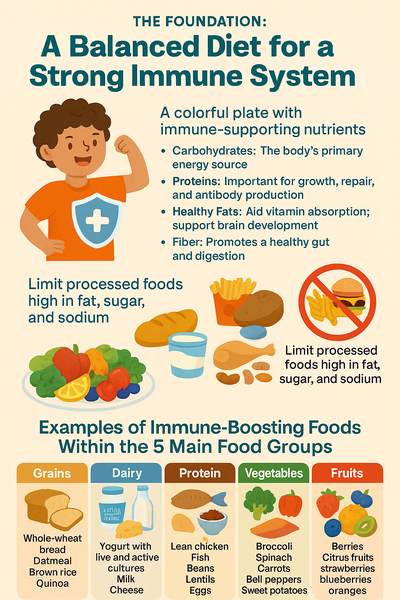
A cornerstone of a robust immune system in children is a well-nourished body. Good nutritional status plays a fundamental role in the development and effectiveness of their immune response to inflammation. A balanced diet, incorporating all five main food groups—grains (with an emphasis on whole grains), dairy, protein, vegetables, and fruits—serves as an excellent starting point. This equilibrium across food groups ensures a steady supply of essential vitamins and minerals that are vital for improving their immune systems. Encouraging a "colorful plate" filled with a variety of fruits and vegetables is also beneficial, as different colors often indicate a diverse range of vitamins and antioxidants. You can find some inspiration for colorful rainbow recipes for kids to make mealtime fun and nutritious.
Each macronutrient plays a distinct role in maintaining a child's overall health and, consequently, their immunity.
- Carbohydrates are the body's primary source of energy, fueling everything from brain function to physical activity.
- Proteins are indispensable for growth and repair, making them particularly important for children who are constantly developing. They also play a crucial role in producing antibodies that help fight infections. Lean sources of protein, such as chicken, fish, and beans, are especially beneficial.
- Healthy fats are necessary for the absorption of certain vitamins and provide essential fatty acids that are critical for brain development. These can be found in foods like avocados, nuts, seeds, and oily fish.
- Fiber aids in digestion and contributes to a healthy gut, which is increasingly recognized as a crucial component of the immune system. High-fiber foods include fruits, vegetables, whole grains, and legumes.
Conversely, it is important to limit the consumption of processed foods. These are often high in unhealthy fats, sugar, and sodium, which can potentially weaken the immune system over time. Diets rich in these types of foods can also negatively impact the delicate balance of gut flora. The connection between a child's diet and the strength of their immune response is direct and significant. Deficiencies in both macro- and micronutrients can lead to a less effective immune system. The body requires a consistent intake of nutrients for growth and repair. Given that the immune system is a complex network of cells and processes, it relies on these nutrients to function optimally. An imbalanced diet results in a lack of essential building blocks and the necessary energy, thereby hindering the immune system's ability to effectively combat pathogens. This can manifest as increased susceptibility to infections and a longer recovery period. Furthermore, the nutritional choices and lifestyle habits adopted early in life have long-term implications for a child's health, including the resilience of their immune system. Establishing healthy eating patterns from a young age can cultivate a positive relationship with food and lay a strong foundation for lifelong well-being. Children are particularly receptive to forming habits early on. The nutrients they receive during these crucial developmental stages are vital for the proper development and maturation of their immune system. Inadequate nutrition during this period can lead to enduring health issues, including a compromised immune system, making them more vulnerable to illnesses throughout their lives. For more on nutrition for growing kids and fostering healthy eating habits, explore our dedicated articles. If you're dealing with a picky eater, our tips on how to turn your picky eater into a foodie might be useful.
Here are some examples of immune-boosting foods within each of the five main food groups:
- Grains: Whole-wheat bread, oatmeal, brown rice, quinoa.
- Dairy: Yogurt with live and active cultures, milk, cheese.
- Protein: Lean chicken, fish (especially oily fish), beans, lentils, eggs.
- Vegetables: Broccoli, spinach, carrots, bell peppers, sweet potatoes. Discover some sneaky veggie recipes to boost nutrient intake.
- Fruits: Berries (strawberries, blueberries), citrus fruits (oranges, kiwi).
You can also explore our collection of healthy recipes for more meal ideas.
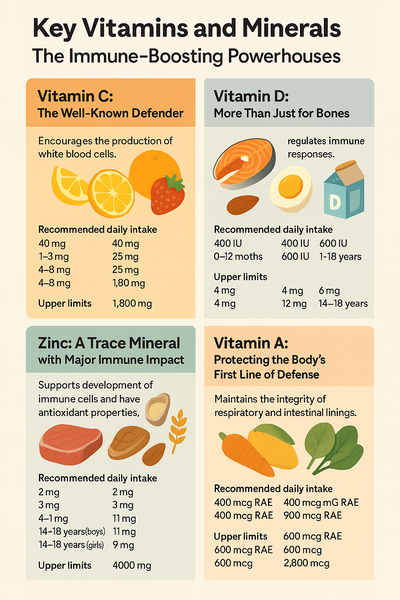
Key Vitamins and Minerals: The Immune-Boosting Powerhouses
While a balanced diet provides a wide array of nutrients, certain vitamins and minerals are particularly instrumental in supporting the immune function in children.
Vitamin C: The Well-Known Defender
Vitamin C is a potent antioxidant that plays a crucial role in protecting the body's cells from damage caused by free radicals. It actively contributes to immune defense by supporting various cellular functions within both the innate and adaptive immune systems. Notably, Vitamin C encourages the production of white blood cells, which are essential for effectively fighting off infections. Some evidence also suggests that adequate intake of Vitamin C may help reduce both the duration and the severity of common cold symptoms. Excellent food sources of Vitamin C that are typically appealing to children include citrus fruits like oranges, lemons, and grapefruit, as well as various berries such as strawberries and blueberries. Other good sources include kiwi, red and green peppers, broccoli, tomatoes, and cantaloupe.
The mechanism through which Vitamin C influences the immune system is complex, involving direct actions on immune cells as well as indirect effects stemming from its antioxidant properties and its role as an enzyme cofactor. Due to its ability to readily donate electrons, Vitamin C acts as a highly effective antioxidant, safeguarding immune cells from the oxidative damage they might incur while combating pathogens. Furthermore, it serves as a crucial cofactor for various enzymes involved in the synthesis of vital biomolecules and in the regulation of gene expression. These processes can influence the development and proliferation of key immune cells, such as B and T lymphocytes. Additionally, Vitamin C enhances the activity of phagocytic cells, including neutrophils, thereby improving their capacity to engulf and eliminate microbes.
The recommended daily intake of Vitamin C varies with age. According to the National Institutes of Health (NIH) and other guidelines, the following amounts are generally recommended :
- Birth to 6 months: 40 mg.
- 7–12 months: 50 mg.
- 1–3 years: 15 mg.
- 4–8 years: 25 mg.
- 9–13 years: 45 mg.
- 14–18 years (boys): 75 mg.
- 14–18 years (girls): 65 mg.
It is important to note these upper limits to ensure safe intake levels:
- Birth to 12 months: Not established.
- 1–3 years: 400 mg.
- 4–8 years: 650 mg.
- 9–13 years: 1,200 mg.
- 14–18 years: 1,800 mg.
Vitamin D: More Than Just for Bones
Beyond its well-known role in bone health, Vitamin D plays a vital part in regulating the immune system, influencing both the innate and adaptive immune responses. It has shown potential in protecting against respiratory infections, which are common among children. Vitamin D also enhances the function of natural killer cells, a type of immune cell that fights viral infections, and stimulates the production of antimicrobial peptides that help combat invading pathogens. Dietary sources of Vitamin D include fatty fish such as salmon, tuna, and sardines, as well as egg yolks and vitamin D-fortified products like milk, yogurt, cereals, and some juices. Sunlight is a significant source of Vitamin D synthesis in the skin, but it is crucial to ensure safe sun exposure. For tips on this, check out our guide on sun safety for kids. Supplementation might be necessary, especially during the winter months or for children who have limited sun exposure.
Vitamin D functions more like a hormone within the body and exerts broad effects beyond skeletal health, including a considerable influence on the immune system at a molecular level. It binds to vitamin D receptors that are present on various immune cells, including T cells, B cells, macrophages, and dendritic cells. This binding initiates intracellular signaling pathways that modulate immune responses. For instance, it can enhance the production of antimicrobial peptides, which directly target and kill pathogens. Vitamin D also plays a role in regulating inflammatory responses, which is essential for preventing excessive inflammation that can be detrimental to health.
The recommended daily intake of Vitamin D, measured in both International Units (IU) and micrograms (mcg), for different age groups is as follows, based on NIH and other guidelines :
- 0–12 months: 400 IU (10 mcg).
- 1–13 years: 600 IU (15 mcg).
- 14–18 years: 600 IU (15 mcg).
It is important to adhere to these upper limits to avoid potential adverse effects:
- 0–12 months: 1,000 IU.
- 1–8 years: 2,500-3,000 IU.
- 9–18 years: 4,000 IU.
Zinc: A Trace Mineral with Major Immune Impact
Zinc, although needed in small amounts, is an essential trace mineral that plays a significant role in the development and function of various immune cells, including T cells, B cells, natural killer cells, neutrophils, and macrophages. It is also crucial for the production of antibodies and cytokines, which are vital components of the immune response. Zinc supports the immune system's ability to function effectively and aids in the healing of wounds. Additionally, it possesses antioxidant properties and helps regulate the body's inflammatory responses. Good food sources of zinc include meat (beef, pork, lamb), poultry (especially dark meat), seafood (oysters, crab), dairy products (yogurt, cheese), nuts, whole grains, legumes, and zinc-fortified cereals. It is worth noting that zinc from animal sources is generally absorbed more efficiently by the body compared to zinc from plant-based foods.
Zinc exerts a crucial regulatory function within the immune system, acting somewhat like a "brake" to prevent excessive inflammation during an immune response. It is also indispensable for the development and maturation of key immune cells, such as T cells, within the thymus gland. Zinc is involved in intracellular signaling pathways within immune cells. It interacts with specific proteins in these pathways, helping to control the intensity and duration of the immune response. Without sufficient zinc, the immune response might become overactive, potentially leading to damaging levels of inflammation. Furthermore, zinc is essential for the proper development and function of the thymus, the primary site where T cells, a critical component of the adaptive immune system, mature.
The recommended daily intake of Zinc for different age groups, according to NIH and other guidelines, is as follows :
- Birth to 6 months: 2 mg.
- 7–12 months: 3 mg.
- 1–3 years: 3 mg.
- 4–8 years: 5 mg.
- 9–13 years: 8 mg.
- 14–18 years (boys): 11 mg.
- 14–18 years (girls): 9 mg.
These upper limits should be observed to avoid potential adverse effects from excessive zinc intake:
- Birth to 6 months: 4 mg.
- 7–12 months: 5 mg.
- 1–3 years: 7 mg.
- 4–8 years: 12 mg.
- 9–13 years: 23 mg.
- 14–18 years: 34 mg.
Vitamin A: Protecting the Body's First Line of Defense
Vitamin A plays a fundamental role in maintaining the integrity of the epithelial tissues that line the eyes, respiratory tract, gastrointestinal tract, and skin. These tissues serve as the body's initial barrier against invading pathogens. It is also important for mucosal immunity and the production of antibodies, which are crucial for fighting infections at these entry points. Furthermore, Vitamin A is involved in regulating both cellular and humoral immune responses, which are essential for a coordinated defense against various types of infections. Dietary sources rich in Vitamin A include preformed vitamin A, found in animal products like dairy, eggs, fish, and liver, and provitamin A carotenoids, abundant in orange and yellow fruits and vegetables such as carrots, sweet potatoes, mangoes, and dark leafy greens like spinach and kale. The body can convert these carotenoids into active Vitamin A.
Vitamin A deficiency is a significant public health concern globally and has been linked to an increased susceptibility to infections and higher mortality rates in children. Supplementation in populations with Vitamin A deficiency has been shown to reduce the incidence and severity of diseases like measles and diarrhea. Vitamin A is crucial for maintaining the structural integrity of the epithelial barriers that act as the body's first line of defense against invading pathogens. A deficiency can lead to the breakdown of these barriers, making it easier for infections to establish themselves. Additionally, Vitamin A plays a role in the development and function of various immune cells, including lymphocytes and macrophages, which are key players in the body's fight against infections.
The recommended daily intake of Vitamin A, measured in micrograms of Retinol Activity Equivalents (mcg RAE), for different age groups is as follows, based on NIH and other guidelines :
- Birth to 6 months: 400 mcg RAE.
- 7–12 months: 500 mcg RAE.
- 1–3 years: 300 mcg RAE.
- 4–8 years: 400 mcg RAE.
- 9–13 years: 600 mcg RAE.
- 14–18 years (boys): 900 mcg RAE.
- 14–18 years (girls): 700 mcg RAE.
It is important to note that these upper limits primarily apply to preformed vitamin A (retinol) found in animal products and supplements. There are generally no upper limits specified for beta-carotene, the provitamin A found in plant-based foods:
- Birth to 12 months: 600 mcg.
- 1–3 years: 600 mcg.
- 4–8 years: 900 mcg.
- 9–13 years: 1,700 mcg.
- 14–18 years: 2,800 mcg.
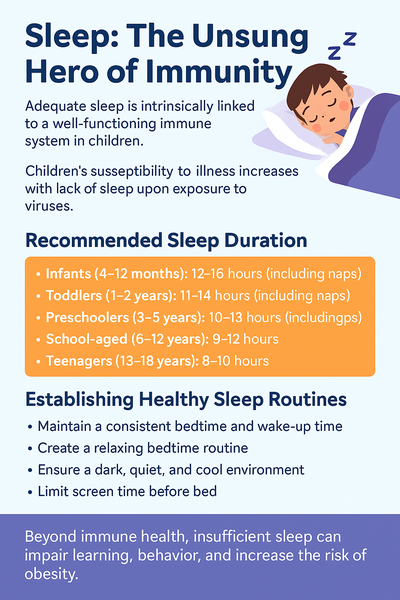
Sleep: The Unsung Hero of Immunity
Adequate sleep is intrinsically linked to a well-functioning immune system in children. During sleep, the body releases proteins known as cytokines, some of which are crucial for fighting off infection and inflammation. Insufficient sleep can suppress the production of these protective cytokines, thereby weakening the immune response. Research indicates that a lack of sleep increases a child's susceptibility to illness when they are exposed to viruses. Learn more about the importance of sleep for children's health and development.
The recommended sleep durations vary significantly across different age groups. Guidelines from the American Academy of Sleep Medicine and other sources suggest the following for optimal health :
- Infants (4-12 months): 12-16 hours (including naps).
- Toddlers (1-2 years): 11-14 hours (including naps).
- Preschoolers (3-5 years): 10-13 hours (including naps).
- School-aged (6-12 years): 9-12 hours.
- Teenagers (13-18 years): 8-10 hours.
Establishing healthy sleep routines is essential for children's immune health. This includes maintaining a consistent bedtime and wake-up time, even on weekends, to regulate their body's natural sleep-wake cycle. Creating a relaxing bedtime routine, such as a warm bath, reading a book, or spending quiet time together, can signal to their bodies that it is time to wind down. Ensuring that the bedroom environment is dark, quiet, and cool further promotes restful sleep. Limiting screen time from electronic devices at least one hour before bed is also crucial, as the blue light emitted can interfere with melatonin production, a hormone that regulates sleep. Encouraging regular physical activity during the day is beneficial, but it is best to avoid intense activity close to bedtime as this can be stimulating.
Beyond its impact on the immune system, sleep deprivation in children can also negatively affect their learning abilities and behavior. Furthermore, it has been linked to childhood obesity due to hormonal imbalances that affect appetite regulation. When children do not get sufficient quality sleep, their bodies are not able to repair and rejuvenate effectively. This impacts various physiological processes, including the production and regulation of immune cells and cytokines. Moreover, sleep is vital for cognitive functions such as memory and concentration, and a lack of sleep can impair these abilities. Hormonal balance, including hormones related to hunger and satiety, is also disrupted by inadequate sleep, potentially leading to increased food intake and weight gain.
The Power of Play: Regular Physical Activity for Overall Well-being
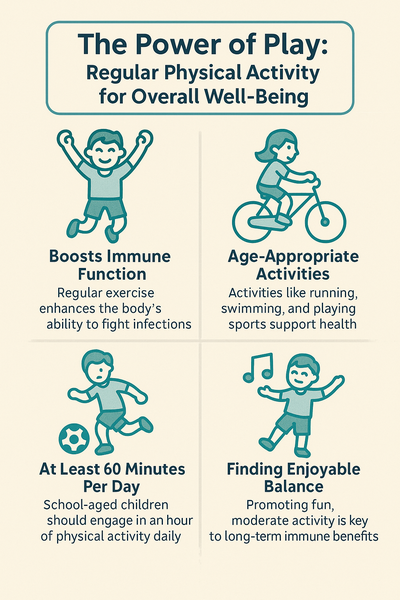
Regular physical activity offers numerous benefits for children, including a positive impact on their immune system. Exercise helps to improve circulation, which in turn allows immune cells to move more freely throughout the body, enhancing their ability to detect and combat pathogens. Physical activity can also aid in flushing bacteria out of the lungs and airways, thereby reducing the risk of respiratory infections. Furthermore, exercise may lead to beneficial changes in the levels and activity of antibodies and white blood cells, which are key components of the immune system. Engaging in outdoor play is crucial for child development and a great way to get them moving.
Encouraging children to engage in age-appropriate and enjoyable physical activities is crucial. This can include running, jumping, dancing, riding a bike, swimming, playing various sports, and even engaging in active play indoors. The key is to make it fun and engaging so that children associate physical activity with enjoyment rather than obligation. Even moderate levels of physical activity can offer significant benefits for immune function. Aiming for at least 60 minutes of physical activity per day for school-aged children is generally recommended.
While very intense and prolonged exercise might temporarily suppress certain aspects of the immune system, regular, moderate physical activity is generally considered beneficial for overall immune function. It is about striking a healthy balance. During moderate exercise, blood circulation increases, which helps immune cells circulate more efficiently throughout the body, improving their ability to identify and respond to infections. However, extremely strenuous exercise can temporarily induce a state of physiological stress that might have a transient negative effect on some components of the immune system. Therefore, promoting regular, enjoyable physical activity that is suitable for a child's age and fitness level is essential for achieving long-term immune benefits.
Keeping Stress at Bay: Nurturing Emotional Well-being for a Stronger Immune Response
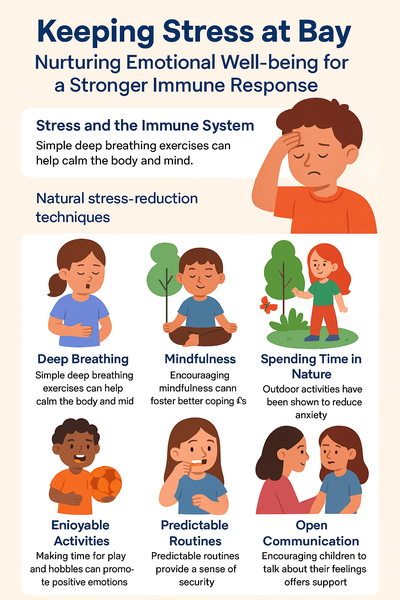
There is a recognized connection between chronic stress and a weakened immune system in children. Elevated levels of stress can trigger hormonal changes within the body that may influence how the immune system responds to threats. Furthermore, prolonged stress can contribute to increased inflammation throughout the body and a reduction in the number of circulating immune cells, potentially compromising the body's ability to fight off infections. Practicing mindful parenting and staying present can help create a calmer environment.
Fortunately, there are several natural and effective stress-reducing techniques that are suitable for children.
- Simple deep breathing exercises, such as belly breathing, can help to calm both the body and the mind when feeling overwhelmed.
- Encouraging mindfulness, which involves focusing on the present moment and cultivating gratitude, can also help children develop better coping mechanisms for stressful situations.
- Spending time in nature and engaging in outdoor activities has been shown to have a calming effect and can effectively reduce anxiety levels.
- Making time for enjoyable activities, such as play, pursuing hobbies, and spending quality time with family and friends, can help children experience positive emotions that counteract the effects of stress.
- Establishing predictable daily routines can also provide a sense of security and reduce feelings of anxiety, especially during times of uncertainty.
- Finally, encouraging open communication about their feelings and providing a supportive listening ear can make a significant difference in how children manage stress.
Research suggests that children from families experiencing high levels of psychological stress may exhibit altered immune responses, including a lower level of spontaneous immune activity but an increased immune response to certain antigens. This indicates a potential imbalance within their immune system. Moreover, experiences of childhood adversity can have long-lasting effects on immune regulation, potentially increasing an individual's susceptibility to illness later in life. Stress triggers the release of hormones like cortisol, which can have both immediate and long-term consequences for the immune system. While a short-lived stress response can be adaptive in certain situations, chronic stress can lead to a dysregulation of the immune system, making it less effective at fighting off infections and possibly increasing the risk of autoimmune reactions. Therefore, fostering a supportive and low-stress environment for children is of paramount importance for their immune health and overall well-being.
Hygiene Heroes: Simple Practices for Germ Prevention
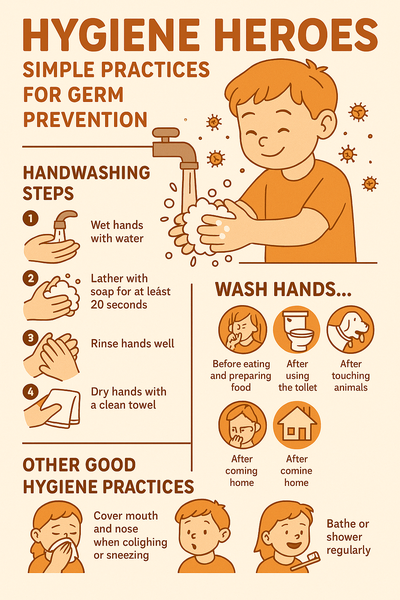
Maintaining good hygiene practices, with a particular emphasis on handwashing, plays a critical role in preventing the spread of infections and supporting a healthy immune system in children. Frequent and thorough handwashing with soap and water stands out as one of the most effective methods for removing germs from the hands and preventing the transmission of common illnesses such as colds, flu, and various gastrointestinal infections.
To ensure effective handwashing, it is important to follow a few key steps :
- Begin by wetting hands with clean, running water, which can be either warm or cold.
- Next, apply soap and lather thoroughly for at least 20 seconds. During this time, make sure to rub all surfaces of the hands and wrists, including the backs of the hands, between the fingers, and under the fingernails.
- Rinse hands well under clean, running water to remove all traces of soap.
- Finally, dry hands completely using a clean towel or by air drying them.
Handwashing is especially important at certain key times throughout the day. These include:
- Before eating and when preparing food.
- After using the toilet.
- After coughing or sneezing.
- After touching animals.
- After returning home from school or other public places where exposure to germs might be higher.
In addition to handwashing, other good hygiene practices such as covering the mouth and nose when coughing or sneezing, taking regular baths or showers, and brushing teeth daily also contribute to overall health and help prevent the spread of illness.
While hand sanitizers can be a convenient alternative when soap and water are not readily available, it is important to recognize that they may not be as effective as thorough handwashing, especially when hands are visibly dirty or greasy. Furthermore, hand sanitizers may not kill all types of germs. Proper handwashing with soap and water remains the most reliable method for preventing the spread of infections. The act of lathering soap and rubbing hands together for at least 20 seconds helps to physically lift and remove germs from the skin, which are then rinsed away with water.
Gut Health: The Unseen Link to Immunity
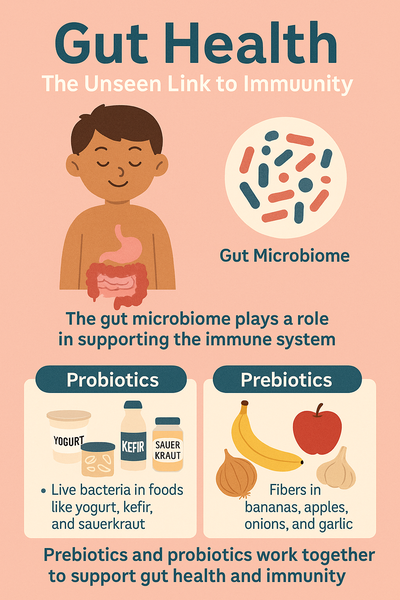
The gut microbiome, a vast community of trillions of bacteria and other microorganisms residing in the digestive tract, plays a surprisingly significant role in supporting the immune system in children. In fact, a substantial portion of the body's immune system, estimated to be between 70% and 80%, is located within the gut. A healthy and balanced population of gut bacteria helps the immune system learn to effectively fight off viruses and manage inflammatory responses.
Two key players in maintaining gut health are probiotics and prebiotics.
- Probiotics are beneficial live bacteria that can provide health benefits when consumed in adequate amounts. They can help support a healthy gut microbiome, potentially reduce the frequency and duration of diarrhea, and improve overall immune function. Food sources of probiotics include yogurt with live and active cultures, kefir, and fermented foods like sauerkraut and kimchi. Common types of probiotic bacteria include Lactobacillus and Bifidobacterium.
- Prebiotics, on the other hand, are non-digestible fibers that act as food for the good bacteria already living in the gut. They support the growth and activity of these beneficial bacteria. Good food sources of prebiotics include fruits like bananas and apples, vegetables like onions and garlic, and whole grains. The fiber found in whole grains, fruits, and vegetables helps to nourish the beneficial bacteria in the gut.
The gut microbiome plays a critical role in "educating" the developing immune system in children, helping it to differentiate between harmful pathogens and harmless substances. An imbalance in the types and amounts of bacteria in the gut during early childhood may increase the risk of developing allergies and other immune-related conditions. The gut serves as a major entry point for pathogens into the body, and the immune system has strategic hubs located all along the gut lining. The gut microbiome interacts closely with this immune system, significantly influencing its development and function. Beneficial bacteria within the gut help to maintain the integrity of the gut's barrier function, which prevents harmful substances and germs from entering the bloodstream. These bacteria also produce various substances that can modulate immune responses throughout the body. Prebiotics and probiotics work together in a synergistic manner to support gut health and immunity. Prebiotics provide the necessary "fuel" for probiotics to thrive, leading to a more robust and balanced gut microbiome. Introducing probiotics adds beneficial bacteria directly to the gut, while consuming prebiotics helps these bacteria (as well as the existing beneficial bacteria) to multiply and function more effectively. This combined approach can have a greater positive impact on both gut health and immune function than focusing on either prebiotics or probiotics in isolation.
Conclusion: A Holistic Approach to Boosting Your Child's Immunity
Naturally boosting your child's immunity is best achieved through a comprehensive approach that integrates various lifestyle factors. This includes ensuring a balanced diet rich in fruits, vegetables, and whole grains, as well as adequate intake of key vitamins and minerals such as Vitamin C, Vitamin D, Zinc, and Vitamin A. Prioritizing sufficient sleep, encouraging regular physical activity, effectively managing stress levels, practicing diligent hygiene habits, and supporting gut health through the consumption of prebiotics and probiotics are all vital components of this holistic strategy. These practices work best when implemented in concert, contributing to a stronger and more resilient immune system. Parents are encouraged to introduce these changes gradually and in a sustainable manner, involving their children in the process to cultivate healthy habits that will last a lifetime. For any specific health concerns or before making significant changes to your child's diet or starting new supplements, it is always advisable to consult with their pediatrician for personalized guidance. You can also find more information and support on our FAQ page or contact us directly.
FAQs About Boosting Your Child's Immunity: Natural Ways to Keep Them Healthy
- Question:
- What are natural ways to strengthen a child’s immune system?
Answer:
You can boost your child’s immunity naturally through a balanced diet rich in fruits, vegetables, and whole grains, adequate sleep, regular exercise, hydration, and maintaining good hygiene. Limiting sugar, managing stress, and ensuring outdoor play for vitamin D exposure also support a healthy immune system. - Question:
- Why is immunity important in children?
Answer:
A strong immune system helps children fight off infections, reduces the severity of illnesses, and supports healthy growth and development. It also improves their ability to recover quickly and decreases the likelihood of chronic health issues. - Question:
- Which foods help increase immunity in kids?
Answer:
Immune-boosting foods include citrus fruits (rich in vitamin C), leafy greens, carrots, sweet potatoes (high in vitamin A), yogurt (probiotics), nuts and seeds (zinc and vitamin E), and lean proteins. These foods nourish the body and help produce immune cells. - Question:
- How much sleep does a child need to stay healthy?
Answer:
Sleep is essential for a strong immune system. Toddlers need 11–14 hours, preschoolers need 10–13 hours, and school-age children require 9–12 hours per night. Consistent, quality sleep supports the body’s ability to fight illness and repair cells. - Question:
- Can exercise help improve a child’s immunity?
Answer:
Yes! Daily physical activity improves circulation, lowers stress hormones, and supports healthy immune function. Encourage fun, age-appropriate exercises like biking, playing outdoors, or dancing to keep their body strong and resilient. - Question:
- What role do vitamins play in a child’s immune health?
Answer:
Vitamins such as C, D, A, and E are vital for immune defense. Vitamin D helps regulate immune responses, while C supports white blood cell function. Most kids get what they need from a varied diet, but supplements can help if there's a deficiency. - Question:
- How can KidyPulse NutriAI help in boosting immunity?
Answer:
KidyPulse NutriAI offers personalized meal plans and immunity-focused nutritional guidance tailored to your child’s age and health needs. It tracks nutrients, recommends foods rich in vitamins and minerals, and helps parents make informed dietary choices to support overall wellness.
Sources used in this blog :
Vitamin C - Consumer - NIH Office of Dietary Supplements
Zinc supplement (oral route, parenteral route) - Mayo Clinic
Vitamin C Dosage Guide for Adults and Children - GoodRx
How Much Vitamin C Should You Take? - Healthline
Vitamin C: What's the Recommended Daily Dose for Kids?
Vitamin A and Carotenoids - Consumer - NIH Office of Dietary Supplements
How much vitamin C kids and toddlers need in their diet - BabyCenter
Zinc - Consumer - NIH Office of Dietary Supplements
Zinc - Health Professional Fact Sheet - NIH Office of Dietary Supplements
Vitamin A and Carotenoids - Health Professional Fact Sheet - NIH Office of Dietary Supplements
Zinc - Stanford Medicine Children's Health
Vitamin A - Nutrient Reference Values - Eat For Health
ZINC: Overview, Uses, Side Effects, Precautions, Interactions, Dosing and Reviews - WebMD
Vitamin A | Linus Pauling Institute | Oregon State University
Clinical Practice Guidelines : Vitamin D deficiency - The Royal Children's Hospital
Vitamin D - Mayo Clinic
Vitamin D Supplements: What Parents Should Know | Children's Hospital of Philadelphia
Vitamin D - Health Professional Fact Sheet - NIH Office of Dietary Supplements
Vitamin D for Babies and Children - MyHealth Alberta
Whole Grains and Immune Health
How to Boost Your Child's Immune System Naturally - Central Oregon Pediatric Associates
Importance of Good Nutrition for Kids - Children's Bureau
How To Build Up Your Child's Immune System - Cleveland Clinic Health Essentials

Comments
No comments yet. Be the first to leave a comment!